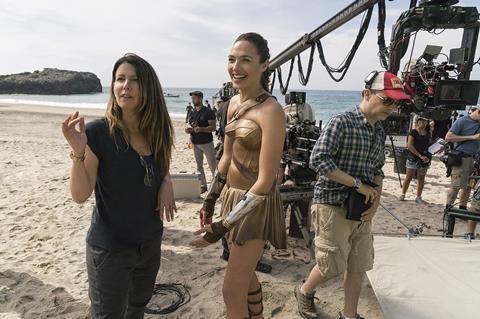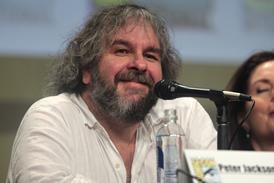Patty Jenkins and DC Entertainment enjoyed a 10-year courtship while they discussed how to approach a Wonder Woman movie. Screen talks to the director about crafting a superhero pic into a surprise awards hopeful.

Director Patty Jenkins is trying to describe how she felt when she heard she had landed the Wonder Woman gig. “It’s probably how people feel about getting engaged,” she says with a laugh. “You know what’s coming and the conversation’s been a very long one about making the wisest choice.”
Jenkins, DC Entertainment and Warner Bros had endured “a 10-year courtship” while they searched for a mutually agreeable approach to the property. “I came very close to doing [Wonder Woman] a year earlier but they had a vision at the time that I did not at all sync up with,” she says during a break from shooting the mini-series mystery One Day She’ll Darken with Wonder Woman actor Chris Pine.
The near-miss was heartbreaking but Jenkins was determined to hold out for the right screenplay draft. After all, several years earlier she had walked away from Marvel Studios’ Thor 2 over creative differences. As a lifelong devotee of the genre who made superhero short films as a student at AFI Conservatory, Jenkins knew she had to get it right if she were to become the first woman to direct a superhero tentpole. She succeeded with bells on; Wonder Woman grossed $822m worldwide and charmed critics. Now, as Jenkins gears up for pre-production on the sequel in the new year, she can rest assured she has created arguably DC Entertainment’s most beloved adaptation. The film’s success has even secured Jenkins a place on Time magazine’s Person of the Year shortlist.
Wonder Woman is an origins story that offers a peek at its protagonist’s native Themyscira before diving into the First World War. Israeli actress Gal Gadot stars as the young Amazonian warrior alongside Pine as an American spy and love interest. Fans have talked often about the film’s heart, and the observation pleases Jenkins. “You can’t get to that level of emotion by accident,” she says. “The whole thing for me was to take this emotional journey and fit it into the hero’s journey, particularly when it’s an origins story. It’s a delicate walk.”
Case in point is the stirring passage when Wonder Woman, aka Diana Prince, leads Pine and his comrades in an attack on German fortifications. “The sequence was being built into the script from page five,” Jenkins says. “You have to be setting up, ‘I want to be a hero. I can’t be a hero. I will try to be a hero. No you can’t, no you can’t, no you can’t.’ You have to set those things up so it ratchets up to the point that when she steps in [to battle] it’s been an emotional build that you’ve been waiting for.”
The film has enough action to appease the most die-hard comic-book fans. A segment in which Amazonians repel an attack by German troops stands out for its balletic quality and sheer exoticism. It shot in Matera, Italy and was the only non-UK location on a shoot that ran from autumn 2015 to spring 2016. “I really did feel going into a battle scene as a woman that I would approach it slightly differently than a man would,” Jenkins says. “It has much more in common with martial arts. There are many martial arts that purely come from a defensive place, so you look to that style of fighting where there’s no gore.”
Gender neutral
While Jenkins is aware of the industry mantle that comes with directing Wonder Woman and was quick to engage in a spat with James Cameron over the depiction of women on film, she does not have an agenda. “I’ve directed Monster and [episodes of US TV’s] The Killing, and worked with all these powerful women and not thought about it all that much,” she says. “I believed the way to make [Wonder Woman] a success was to just go and make a great film and not think about it being for the women.”
Jenkins cannot overstate the significance of Monster, which came her way straight after film school and won Charlize Theron the best actress Oscar in 2004. “Right out of AFI, a door opened,” she says. “Monster was a bigger game-changer than Wonder Woman in a way, and it prepared me for this kind of thing. I went from zero to 60 with that movie.”
After that, Jenkins admits she struggled to get things made, and built “a track record of delivering pilots with responsibility to television networks”. That hustle and experience, allied to her passion for superheroes, ultimately secured her the Wonder Woman job.
On the topic of sexual predators in Hollywood and the attendant media frenzy, the director says that while she has never been on the receiving end of unwanted male behaviour, the time is right for systemic change. “The volume of [the scandal] might need to be this high in order to provoke real change,” she observes. “People have to get truly scared of behaving that way to stop, and this might be what was needed to do that.”

























No comments yet